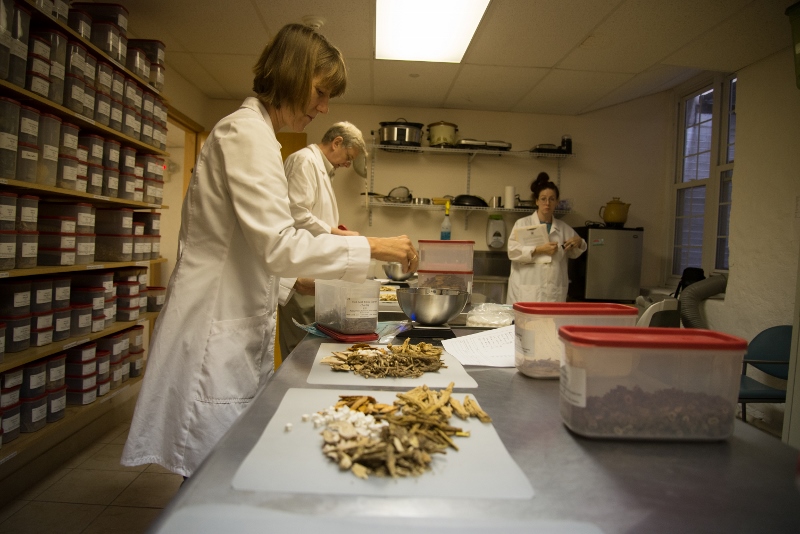by Jacqueline Lacava L.OM, Dipl.OM
A Certificate in Chinese Herbal Medicine is ideal for licensed acupuncturists who want to improve the quality of their patients’ lives.

As acupuncture has become more widely accepted, more top healthcare facilities are also embracing Chinese herbal medicine. A Certificate in Chinese Herbal Medicine is a common stepping stone and asset for practitioners especially as more states are requiring certification in order to practice.
Adding Chinese herbal medicine to your practice can improve efficacy in the treatment of many common medical problems including respiratory diseases, digestion, mental disorders, heart disease, and fertility.
How Chinese Herbs Work
Chinese herbal medicine has been around for centuries, offering a natural approach to improving patients’ health. While this practice began in Asia, it started gaining acceptance outside of China and other Asian countries over the years.
Compared to Western medicine, which focuses on treating symptoms, Chinese herbal medicine concentrates on patterns and patients. It emphasizes the pattern differentiation concept, which considers a patient’s head-to-toe symptoms — all with the goal of trying to balance the entire body.
Because of this, the types of herbs used are individualized based on the patient’s unique signs and symptoms. Similarly, the treatment length can often vary depending on what is unbalanced. Chinese herbal medicine can also vary in form, ranging from teas to easily digestible capsules.
Chinese Herbal Medicine Benefits for Patients
Chinese herbal medicine offers several benefits for patients. It’s especially beneficial for individuals who have conditions or syndromes that are difficult to diagnose or treat.
When prescribed by a practitioner of Chinese herbal medicine, herbs are considered to be a very safe and effective treatment solution. They can be used for all kinds of conditions, including:
- Chronic fatigue.
- Digestion issues.
- Allergies.
- Immune system regulation.
- Autoimmune disorders.
- Menstrual pain.
- Menopause.
Depending on the patient’s symptoms and the type of herb they’ve been prescribed, the herbs can be taken alone or used as part of a comprehensive treatment plan including acupuncture and other modalities under Traditional Chinese Medicine. Typically, the herbs are taken daily and can vary in how they are delivered, either via herbal teas or with capsules. The Chinese herbs will usually be taken for a few months while the patient is monitored regularly to ensure the best results.
How to Become a Chinese Herbalist
Want to learn more about Chinese herbs? At Won Institute of Graduate Studies, our Certificate in Chinese Herbal Medicine program provides students with an in-depth look into how Chinese herbs can address ailments, illness and disease. Students will learn how to identify and use over 300 herbs and over 100 herbal formulas. These herbs and formulas can then be used to treat everything from digestive issues to mental illness.
This is a hybrid-learning program with classes conducted online in synchronous and asynchronous format. Clinical requirements like our Clinical Internship and Clinical Observation will be held on-site.
Once students understand and become proficient in diagnosing, mixing and administering herbs and formulas, they can join the Chinese herbal medicine clinic, where they’ll gain real-life experience working with patients.
Students must first take our Acupuncture program and can choose to dual-enroll in the Certificate in Chinese Herbal Medicine Program in their third year of Acupuncture studies.
Our Certificate in Chinese Herbal Medicine Program
If you are considering adding herbs to your practice, here are three things you can expect of the Won Institute’s Certificate in Chinese Herbal Medicine program.
- Leadership: The program is meant to create leaders in the field of Chinese medicine through fostering confidence in diagnosis and treatment planning. You are deepening your knowledge of internal medicine and physiology.
- A re-introduction to the classics: Our program starts with the historical timeline of Chinese medicine as you learn single herbs. You learn important theoretical concepts and a historical context from which you can build your knowledge of single herbs and formulas right from the beginning.
- Critical thinking: In our biomedicine courses, we bring students back to reading research geared toward assessing the quality and assimilating research outcomes into making our medicine even safer. A foundation in critical thinking makes better practitioners.
How Is This Program Unique?
The Certificate in Chinese Herbal Medicine program focuses on the therapeutic use of Chinese herbal medicine with an emphasis on classical and modern approaches to treatment. Our students develop a comprehensive understanding of Chinese herbal medicine. In addition, meditation is incorporated into class time to enhance mindfulness in learning and clinical practice. To ensure our students are equipped to fine-tune their technical and diagnosis abilities, they spend the last 13 months of the Chinese Herbal Medicine program treating patients in the Chinese Herbal Medicine Student Clinic at Won Institute, using high quality Chinese herbs from our state of the art Chinese herbal dispensary.
Apply to Our Chinese Herbal Medicine Program Now
If you are a current Acupuncture student or alumni of an ACAHM accredited institution, and are interested in becoming a licensed practitioner of Chinese herbal medicine, the Won Institute of Graduate Studies can help you get started.
Ready to improve the quality of your patients’ lives?Connect with our Admissions Department today, or get started on your application.
Appreciating the time and effort you put into your site and detailed information you present.
It’s nice to come across a blog every once in a while
that isn’t the same unwanted rehashed information.
Wonderful read! I’ve bookmarked your site and I’m
adding your RSS feeds to my Google account.
Also visit my web page Italian Mood Erboristeria online
I am looking forward to attending Won’s program for herbal medicine, this all sounds very good.
Thank you,
Jim Green DC,MS,LMT